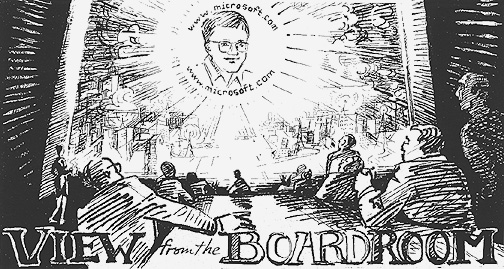
Midway through 1996, no media image is more appealing - or more misleading - than the wondrous realm known as cyberspace.
By now, most print and broadcast outlets are deeply involved in cyberhype. News reports keep track of cybercompetition. Feature stories extol the savvy moves of cyberinvestors. Commentators hail our cyberfuture. And, as you may have already noticed, writers strain to invent new cyber words.
It's pleasant to believe that the Internet will provide a free flow of information and opinion. The rhetoric makes plenty of egalitarian claims - but the emerging reality is something else.
"The Internet is in full transition from a participatory interactive communications network to a broadcast medium dominated by electronic commerce," observes Frank Beacham, a journalist who monitors technology. Viewed from corporate boardrooms, the ideal Internet users will be passive consumers.
Smart money is betting that the most heavily visited sites on the World Wide Web will be the ones with deep pockets behind them. Lots of publicity and multimedia leverage will be crucial to steer a mass audience to particular spots on the vast Internet.
Perhaps no company is better positioned to do such steering than Microsoft. At the end of last year, Microsoft announced plans to redirect its on-line strategies to the Internet, where the powerful firm is now implementing a financial battle plan based on advertising. As Wired magazine notes, Microsoft will "act like a broadcaster" in cyberspace. The resemblance to network television is even more striking in terms of content.
Microsoft owner Bill Gates has chosen to team up his company with a news organization (NBC) led by Tom Brokaw, and a huge cable conglomerate (TCI) run by a Rush Limbaugh fan named John Malone. The thread that connects them all is the bottom line.
Such alliances promise to be enormously profitable for Microsoft. Gates may be at the cutting edge of cyberspace technology and ultramodern marketing. But his guiding principle is as old as the hills: insatiable greed.
The way things are going, Beacham warns, the Internet will undergo a profound shift - "from being a participatory medium that serves the interest of the public to being a broadcast medium, where corporations deliver consumer-oriented information. Interactivity would be reduced to little more than sales transactions and e-mail."
With gee-whiz enthusiasm permeating so much media discussion of cyberspace, we tend to think of the Internet as a dramatic departure from the past. But this is hardly the first time that high-tech advances have been confused with grassroots democratic empowerment.

Fifteen years ago, as cable television arrived with great fanfare, the futurist Alvin Toffler discerned "a truly new era - the age of the de-massified media." "Just around the corner was cable-wired democracy. Instead of masses of people all receiving the same messages, smaller de-massified groups receive and send large amounts of their own imagery to one another."
Consider Toffler's paean to cable technology the next time you're stuck in a motel room flipping through the cable channels.
It's easy to be mesmerized by a techno-fix that seems to offer a way of cutting through knotty social problems. To substitute for figuring out how to create systems of communication that are genuinely democratic, believers in the techno-fix assume that a brilliant new technology can dissolve the bottlenecks.
It never works. From radio to television to modem, each new gizmo has arrived with inspiring potential , undermined by extreme disparities in people's access to economic resources and political clout. Now, billionaire Bill Gates and his collaborators are smiling as they pour big investments into the Internet and tie those projects to other mass-media endeavors.
The middle of July brought the the launch of MSNBC, a 24-hour news channel on cable television that's a joint venture of Microsoft and NBC (owned by General Electric). Many of the channel's programs will promote interactive companion activities on the Internet. Rather than getting away from the centralized power of a network like NBC, such cyberspace synergies will only amplify it.
"Microsoft's extensive reach into the interactive media business could well make it the world's first 21st-century media company," industry analyst Denise Caruso writes in Wired. Not a comforting thought.
Norman Solomon is a syndicated columnist and co-author (with Jeff Cohen) of Through the Media Looking Glass: Decoding Bias and Blather in the News.
 |
 |
 |
 |
 |